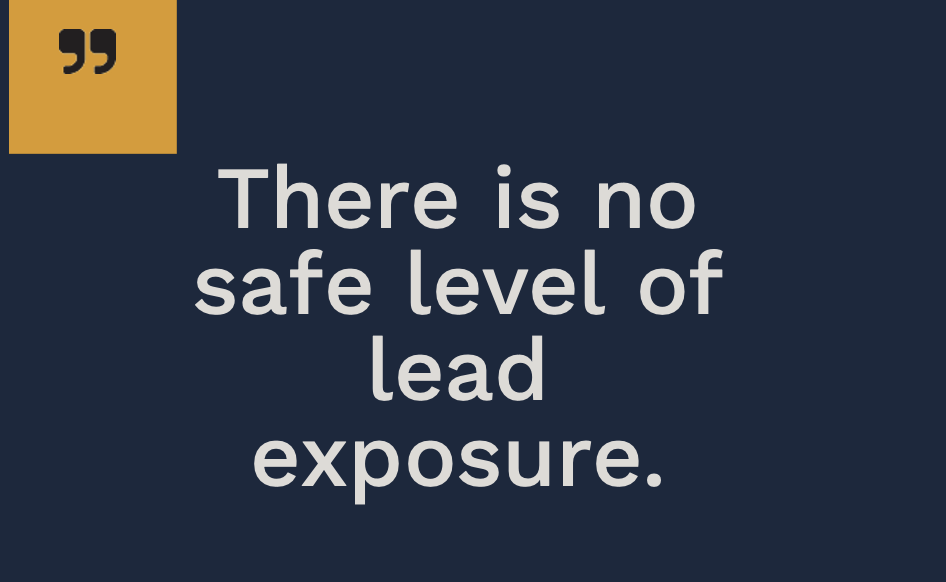
Get the Lead Out!!
Get the Lead Out!!

LC Innovations, LCI, has recognized lead exposure as a significant concern for members law enforcement, military personnel, and other employees whose duties involve the use of firearms. Even at low levels, lead exposure poses serious health risks that can affect multiple body systems. According to the Centers for Disease Control and Prevention (CDC), there is no safe level of lead exposure. Prolonged or repeated exposure to lead can result in:
Neurological damage: Lead can severely impact the brain, leading to cognitive decline, memory loss and difficulties with focus and concentration. Studies have shown that even minimal exposure can lower IQ levels and impair overall brain function, particularly in frequently exposed individuals.
Kidney damage: Long-term lead exposure is linked to kidney disease and can cause long-lasting harm to kidney function. Research indicates that chronic exposure increases the risk of kidney failure, particularly in individuals who have been exposed over extended periods.
Elevated blood pressure: Lead has been shown to contribute to higher blood pressure, which in turn increases the risk of developing cardiovascular diseases, including heart disease and stroke.
Reproductive health risks: Lead exposure has been associated with reproductive issues such as decreased fertility, complications during pregnancy, and sperm count reductions in men.
In the U.S., it is estimated that over 4 million homes (www.cdc.gov/nceh/lead/) still have elevated lead levels, with adults in certain professions, such as law enforcement and military roles, being at heightened risk. Even low levels of lead in the body can increase the likelihood of death from heart disease by as much as 37%, according to several studies.
To help minimize these risks, LCI has created the best practice guide to educate employees on the dangers of lead exposure and provide practical advice on reducing their risk. This guide empowers employees with the knowledge and tools to protect their health while performing their duties.
Best Practice Guide for Lead Safety at Indoor & Outdoor Shooting Ranges for Law Enforcement
Lead exposure is a serious health risk for law enforcement officers and others who work at shooting ranges. This guide provides the best practices to help reduce lead exposure and create a safe environment at both indoor and outdoor ranges. It also includes important health and safety regulations to help ensure compliance and safety.
Understanding Lead Exposure
Lead is a harmful metal often found in bullets. You can be exposed to lead by breathing dust or fumes, swallowing it, or touching it, picking up spent brass, and cleaning weapons. Long-term exposure can cause serious health problems, including damage to the brain, lungs, and reproductive system.
Best Practices for Lead Safety
Training and Awareness
- Hold regular training sessions about the risks of lead exposure and safety procedures.
- Make sure all staff know the signs of lead poisoning and the importance of reporting health
- Follow the ANSI/ASSE 1 guidelines for effective safety training.
Personal Protective Equipment (PPE)
- Provide and require the use of appropriate PPE, as specified for each task performed on the shooting range, such as:
- N95 respirators or better for indoor ranges, following OSHA regulations (29 CFR 1910.1025).
- Gloves to avoid skin contact with
- Eye protection to guard against lead
- Special clothing and a N95 respirator, if possible, that can be removed after shooting.
- If special clothing is unavailable, the best practice would be to launder the clothes before leaving the range or change into another set after training.
Lead-Free Ammunition
- Use lead-free bullets whenever possible to lower the risk of lead exposure. This includes:
- Alternatives like copper, polymer, or frangible
- Promoting lead-free ammo during training
Handwashing Protocols
- Set mandatory handwashing rules:
- After shooting or handling ammo, ensure personnel wash their hands thoroughly with soap and water.
- Provide handwashing stations with soap, water, and disposable
- Use special wipes to clean hands and surfaces before eating or
Lead Wipes and Mats
- Keep lead wipes available at shooting stations and in your vehicle to quickly clean lead from skin and equipment every time you finish firing your weapon.
- Use lead mats in shooting areas to catch falling lead particles and prevent contamination.
- Clean and replace these mats
Ventilation Systems
- Make sure indoor ranges have good ventilation systems to reduce airborne lead particles, following OSHA guidelines (29 CFR 1025).
- Regularly check and maintain these systems for optimal
Regular Cleaning Protocols
- Follow a strict cleaning schedule to limit lead build-up:
- Use wet cleaning methods (like damp mopping) to reduce
- Avoid dry sweeping or vacuuming unless you use HEPA
- Frequently clean shooting booths, targets, and surrounding
Laundering Clothing Concerns
- Provide guidelines for washing clothes worn during
- When possible, use specific clothing for shooting to prevent lead
- contamination of regular
- Change into a second set of clothes and launder clothing at the range if If you have to launder your clothes at home, wash shooting clothes separately from other laundry.
- Use hot water and strong detergent to remove lead
- If possible, consider contracting a laundry service that can launder hazardous materials.

Weapon Cleaning Best Practices
- Cleaning Area: Designate specific areas for cleaning weapons, preferably with good ventilation to minimize lead exposure.
- PPE for Cleaning: Wear proper PPE, such as gloves and eye protection, when cleaning firearms to avoid lead contact.
- Use of Lead-Free Cleaning Products: Use lead-free cleaning solvents and materials to reduce lead contamination.
- Cleaning Methods:
- Use wet cleaning methods, like damp cloths, to prevent lead dust from becoming airborne.
- Avoid dry brushing, compressed air, or sweeping, as these can spread lead particles.
- Properly Dispose of Cleaning Materials: To prevent lead contamination in regular trash, dispose of used cleaning rags and materials in sealed
Lead Monitoring and Assessment
- Conduct regular air quality checks to monitor lead levels, especially in indoor ranges.
- Offer lead screening blood tests for employees who may be exposed to
- lead, with follow-up as The agency should keep a Lead Exposure Survey for each employee and update it annually. This survey should also include activities outside of work, such as reloading, sport or target shooting, stained glass window restoration, etc.
Designated Areas for Ammunition Handling
- Set up specific areas for handling and reloading ammo away from general shooting zones.
Waste Management
- Follow Resource Conservation and Recovery Act (RCRA) guidelines for safe disposal of lead The RCRA is a U.S. law regulating hazardous waste management, disposal, and treatment. In relation to lead exposure, the RCRA ensures that lead-containing waste is handled correctly and disposed of to prevent environmental contamination and protect human health.
- Use designated containers for lead waste and ensure regular pickup by certified hazardous waste services.

Outdoor Range Considerations
- Avoid or limit shooting on windy days to reduce lead being
- Maintain a safe buffer zone around outdoor ranges to prevent lead contamination.
- Regularly check soil and water near outdoor ranges for lead
Health Surveillance Programs
- Develop a lead exposure monitoring program to monitor the health of employees exposed to lead.
- Provide access to medical evaluations and support for those showing
Employee Engagement
- Educate all employees about lead safety practices and measures in place at shooting ranges.
- Encourage partnerships for environmental monitoring and lead reduction efforts.
Summary
Following these guidelines for lead exposure at shooting ranges, law enforcement officers can lower their risk of lead exposure. Training, blood monitoring, and a focus on safety are essential for keeping a healthy work environment. Law enforcement agencies can protect the health of their personnel and their families by adhering to important regulations, including OSHA standards and EPA guidelines.
Remember, at LCI, we are committed to supporting your organization’s loss control and workplace safety needs. As a nationally recognized leader in safety consulting and risk management, LCI brings extensive experience and proven expertise to every client partnership. Want to learn more about LCI and how they can help improve your safety? Head over to Risk Management/Loss Control and Safety Consultation – MC Innovations.
Sources
- Occupational Safety and Health Administration (OSHA)
- 29 CFR 1025 – Lead: OSHA Lead Standard
- 29 CFR 62 – Lead in Construction: OSHA Lead in Construction
- National Institute for Occupational Safety and Health (NIOSH)
- NIOSH Pocket Guide to Lead Hazards: NIOSH Pocket Guide
- Environmental Protection Agency (EPA)
- Resource Conservation and Recovery Act (RCRA): EPA RCRA Regulations
- American National Standards Institute (ANSI)
- ANSI/ASSE 1 – Criteria for Accepted Practices in Safety, Health, and Environmental Training: ANSI Z490.1
- Health and Safety Executive (HSE) (UK)
- Working with Lead: HSE Working with Lead
- Resources and best practices for shooting ranges: https://epa.gov/lead/best-management-practices-lead-outdoor-shooting-ranges

Managed Programs... Managed Better
Experts in Risk
Management Consulting
Address
5540 Falmouth Street
Suite 203
Richmond, VA 23230


